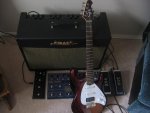Re: Electric Guitars
I'm a 46 year-old who has been playing since I was 14. There have been some interesting statements that I don't necessarily agree with, but opinion in subjective. I would like to add some things that I have learned over the years.
I think that low action (small clearance between the strings and frets) is often overrated. While it may be easier to finger a chord on a guitar with low action, it can lead to string buzz, where the strings vibrate against the remaining frets between the fingers and bridge. Most blues and rock players with experience that I know find a balance between action and the ability to avoid fret buzz while bending notes... and things like neck curvature, fret-board radius, and lots of other technical setup can be incorporated to address these issues, but alas, this is about a beginner and his guitar.
If the kid is interested in an electric, I agree that you should start there. Interest leads to more of the same in the eyes of the student. It's how I started, and several years later - after I realized I was barely competent on an acoustic (they are very different instruments in my view) - I pursued that, returning to my love of electrics after several years.
My first guitar: I have always been a tinkerer, so starting out with a $10 electric no-name Strat copy, I learned relatively quickly to become my own guitar technician. That said, I don't recommend it, but that first guitar was pretty functional, and I gave it to a nephew years later to learn on (he lost interest and his mother tossed it out... disappointing). My first amp was an old stereo amplifier wired to a 12" RCA speaker salvaged from a monophonic record player from the fifties. Sounded like crap to everyone else in the house, but not to me. Pure gold. And all this equipment cost me... $10.
Regarding tremolos, I always had them, used them semi-frequently, and never had issues with keeping the guitar tuned if I didn?t go crazy with them. I still use them sparingly, but like them. A hard bridge is easier for the new student to tune, but I wouldn?t avoid tremolos either. Good tuning hardware at the machine-head is easily as important regarding keeping the thing in tune.
The first new electric I bought was an '85 Fender Squier Stratocaster, which was Fender's new model line made either in Korea or Japan. At the time, all Strats and Tele's where American made (No Mexicans), but you couldn?t buy and American Fender in ?85 because the Corona factory was under construction and the old plant was closed. Years later, Squier became the ?low end? Fender line, but I still think they make a great product for the price. My old Squier (aside from the original crappy electronics) is one of the best set-up Strats I have ever played, including my MIA (Made In America) Strat that is my pride and joy to play. I also own several other pricy guitars, but the cheapy?s always turned me on, because I always manage to tune them up and make them sound good, with few exceptions.
There are lots of inexpensive guitar builders out there, and each has a certain reputation for quality, but what I find is that it comes down to the individual axe. Pick up two ?identical? Epiphones (basically the Squier of Gibson, so-to-speak) each with new strings, and one often sounds flat while the other sings. Again, it comes down to the set-up, and with mass-produced guitars, that varies with each instrument. Check intonation by plucking an open string and again at the 12th fret? they should sound the same.
If it were me, I would consider any electric guitar in the $150 ? 250 range that your son likes the looks of. From there, compare between what?s available and what sounds good to you.
The guitar packs are OK (Guitar and Amp packaged together with strings, cord, strap, etc.), but as far as inexpensive amps are concerned, I have always liked practice amps (10W to 15 W) by Peavey and Crate? The guitar snobs always heckle me for this, but these amps really are reliable and decent sounding products for the most part, perfect for the beginner. Pedals, effects, plug-ins? the options are endless, and in the guitar world, most of us get something we call GAS (Guitar Acquisition Syndrome). It?s a disease, much like my diagnosed BAS (Boat Acquisition Syndrome), but that?s a different thread.
There are several hundred more things I could suggest, but you don?t really need to hear it all. Find out what you son thinks is cool, and go with that. If he sticks with it, be prepared for the worst if he catches a wicked case of GAS.




















